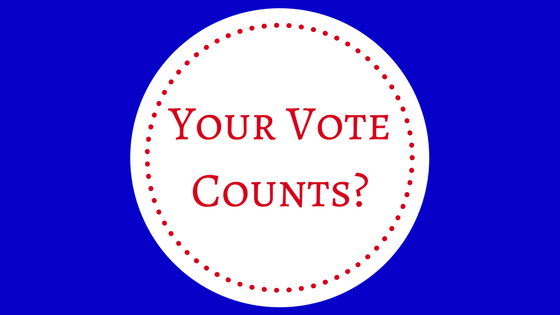By Lauren Small

“Your vote counts.” Election years are plagued with this phrase as donkeys and elephants ramp up their campaign tours. It’s a trigger phrase that signifies the United States is still a democratic country. However, conspiracy theorists challenge the 15th Amendment of the U.S. Constitution which states, “U.S. citizens’ right to vote shall not be denied or abridged by the United States or by any state on account of race, color, or previous condition of servitude.” Theorists speculate that while advertising campaigns such as “Rock the Vote” and “Your Vote Counts” encourage individuals to exercise that right, your submitted ballot does not actually affect the outcome of a national election (or anything for that matter).
The controversy lies with the role of the Electoral College. During a presidential election year, each state holds an election. Author of “The Selling of Rural America” David Walbert describes the electoral process in which “the outcome of the vote in each state determines a slate of electors who then, in turn, make the actual choice of president and vice president. States may or may not require their electors to vote with the popular majority, and they may or may not give all of their electors to the winner of the statewide popular vote.” The options for the Electoral College to vote with or against its state’s popularity causes many voting citizens to question whether our votes actually matter.
A state’s population determines the number of electoral votes. In other words, the larger the state, the more electoral votes it receives. But the larger the population, the less weight each vote holds. According to an article from Huffington Post, “this so-called ‘indirect election’ process has been the subject of criticism and attempted reform, though proponents of it maintain that it ensures the rights of smaller states and stands as an important piece of American federalist democracy.” The system was created to give smaller states a voice underpowered by populous states.
The democratic duty of America is to create a safe space for all voices to be equally heard, which the electoral college achieves for smaller states. Yet this system fails the American people by weakening the voice of the majority.
However, the recent local elections show a cultural shift in the American voter. Despite the massive file cabinet of conspiracies, this year’s congressional and state elections had residents voting loud and clear at their state and local polls. Democrats pulled out a big win in New Jersey’s gubernatorial race. Charlotte, N.C. elected Vi Lyles as its first black woman mayor. Also, Virginia elected its first openly transgender official, Danica Roem. These votes confirm that Americans aren’t just voting, but their votes are making a difference. Traditionally conservative states are more unpredictable than ever. The purest way to capture every citizen’s vote is to follow the one-person, one-vote approach and dismantle electorates voting on behalf of millions.
Our nationwide structure has been a controversial topic for at least two centuries. Pro-voting campaigns are created to lure young voters into the polls to change the direction of the country. But, America must be willing to change the direction in which we vote.



























